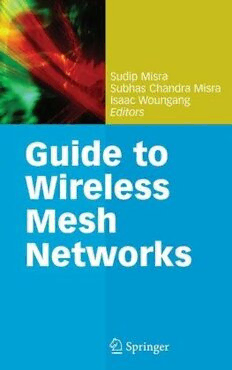
Guide to Wireless Mesh Networks PDF
507 Pages·2009·13.393 MB·English
Most books are stored in the elastic cloud where traffic is expensive. For this reason, we have a limit on daily download.
Preview Guide to Wireless Mesh Networks
Description:
Wireless communication technologies continue to undergo rapid advancement. The attractiveness of Wireless Mesh Networks (WMN)s, in general, can be attributed to their characteristics: the ability to dynamically self-organize and self-configure, coupled with the ability to maintain mesh connectivity, leads in effect to low set-up/installation costs, simpler maintenance tasks, and service coverage with high reliability and fault-tolerance. As a result, WMNs have found many useful applications in a broad range of domains.WMNs represent a key technology for future generation wireless networks, and this broad-ranging and comprehensive guidebook presents new ideas and results from research to address the challenges ahead. This unique resource describes all the fundamental key topics and covers both the important core and specialized issues in the field. Each chapter is written by topical area experts, with the first chapters devoted to the basics of WMNs and subsequent ones dealing with some of the more specialist topics, such as the WiMAX metro area mesh networks and the symbiosis of cognitive radio with WMNs.Features:• Provides an accessible, comprehensive overview of the state-of-the-art technology of Wireless Mesh Networks• Includes reader-friendly discussions for practitioners, directions for future research, helpful lists of terms and definitions, and summary questions within each chapter • Offers a set of questions to help readers assess their understanding of the various concepts at the end of each chapter• Presents insight into the practical significance of these topics in real-world scenarios• Designed, in structure and content, to aid the learning process with the intention of making the book useful at all learning levels• Supplies supportive presentation PowerPoint slides and solutions to aid lecturers at www.springer.com/978-1-84800-908-0With contributions by some of the most prominent researchers in the field today, this book will be an invaluable reference/text to WMNs for researchers and practitioners. In addition, its pedagogical tools can make it eminently suitable as a textbook for graduate students wishing to learn more about the topic.Key Topics:WMNs and MANETsMedium AccessRouting and Channel AssignmentRouting MetricsCongestion and Transport Layer IssuesMulti-network Convergence and ScalabilityMobility
See more
The list of books you might like
Most books are stored in the elastic cloud where traffic is expensive. For this reason, we have a limit on daily download.
